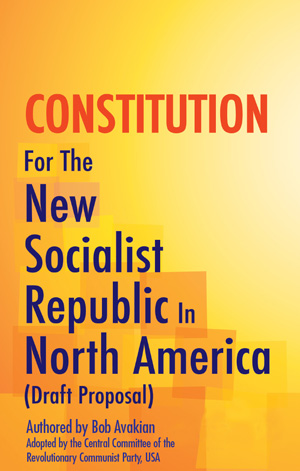Four Months Into the Global COVID-19 Health and Economic Crisis...
Notes on the Utter Cruelty and Obscene Irrationality of Capitalism-Imperialism
by Raymond Lotta
| revcom.us
[W]hile there is certainly a legitimate and positive desire on the part of people everywhere to get beyond the scourge of this virus, taking into account what is the actual situation for the masses of humanity under the “normal” domination of this system, no one should desire a return to the “normalcy” dictated by the capitalist-imperialist system
—Bob Avakian, from The Deadly Illusion of “Normalcy” and the Revolutionary Way Forward
These are some initial reflections on the impact of the COVID-19 pandemic on the imperialist world economy and the people of the world. These reflections are offered to contribute towards understanding this unprecedented situation and the potential for radical upheaval. Further reflections will be coming.
Part I
1) A point of basic understanding and orientation. COVID-19 is a natural-biological phenomenon. It is a highly transmissible and lethal virus. But how this health crisis has unfolded and how it has been responded to...that has everything to do with, is stamped by, the system we live under. That system is capitalism-imperialism.
Humanity is facing a global health crisis on a scale unparalleled since the 1918 influenza pandemic. That pandemic infected one-third of the world's population and led to 50 million deaths. COVID-19 (coronavirus) was first detected in China in December 2019—and quickly became a global health crisis. Worldwide, there are now almost 14 million confirmed cases and over 590,000 (known) deaths.
There is no vaccine yet for the coronavirus, no effective therapy treatments. It is uncertain how long (now calculated in years) humanity will be facing the coronavirus and its consequences. This disease is occurring within, and humanity is tightly bound by, a global economic system: capitalism-imperialism.
This system is the greatest barrier to coping with this crisis in the interests of the billions on this planet. Why?
Capitalism is organized around private ownership of highly developed and socialized means of production: factories and equipment, raw materials and technology, transport and communications, along with vast networks of distribution. This system has an inner dynamic. Capitalists are driven by competition to produce profit and more profit based on the exploitation of laborers who do not own or control those means of production.
Competition compels individual capitals to cheapen costs and expand production in order to gain market share and beat out rivals... or find themselves beaten. In telecommunications, Nokia, Apple, Samsung, and Huawei battle it out for markets, over patents, and for cost-efficiency in production (which includes child labor in the mines of Congo).
This is a system in which profit governs, shapes, and distorts investment priorities and decisions through all sectors of the economy.
Consider these two facts in relation to disease prevention and treatment under capitalism:
- In the late 1990s, 39 of the world's largest drug companies sued the South African government to keep affordable, generic anti-HIV drugs out of the hands of people afflicted with the disease. It took years for the anti-viral HIV treatments to finally reach Africa. That's murder!
- As late as 2016, major drug companies “opted out” of developing a vaccine against the malaria parasite that was killing hundreds of thousands of children in poor countries each year, especially in Africa. Why? Well, as stated baldly in the business pages of the New York Times, “there is no money to be made from a vaccine for poor children who could not possibly pay for inoculation.”*
No Conscious and Comprehensive Economic-Ecological Planning
Under this system, the resources and capabilities of human society are not utilized for the benefit and betterment of world humanity. There is NO conscious and comprehensive economic-ecological planning. On the one hand, the modern imperialist-capitalist economy is highly interdependent: GM needs aluminum and machine tools, trained workers, and people buy their autos. But in an economy of private ownership and control, of competing capitals, each aiming to maximize profits—those requirements are met through buying and selling on the market. Whether investments “pay off” is discovered “after the fact.”
Huge blocks of capital dominate the U.S. economy as a whole—and interact with each other fundamentally as rivals. The U.S. imperialist state safeguards the strategic interests of the capitalist ruling class (even as sections of the ruling class fight over how those interests should be met or might be changing).
So for all these reasons and more, it is NOT possible under this system to take the measure of the great needs of humanity and to rationally organize production and allocate resources to meet basic social needs, like food, shelter, and health, and to provide for a rich intellectual and cultural life. It's not what happens... and it can't. But it is possible! By making a revolution to overthrow this system and replace it with socialism in transition to communism as set forth in the Constitution for the New Socialist Republic in North America, authored by Bob Avakian.
In an economy of rapidly shifting markets, profit opportunities, and high-stakes competition—the horizons of individual capitals are short term. Tesla, Dell, Microsoft and others are not concerned about the long-term environmental impacts of mining cobalt for lithium batteries (not to mention the human cost). Again at the society-wide (and global) level, there is no advance planning. To anticipate and prepare for natural and health disasters, to the greatest degree possible given existing knowledge and forecasting capacity. To prepare for climate emergencies (like hurricanes and longer-term sea-level rise); for disease and health emergencies; and for other near- and longer-term challenges.
So before the COVID-19 pandemic, there was a criminal lack of preparedness: little funding and little research and development of treatments for the kinds of animal-to-human diseases that have appeared more recently and more frequently worldwide... the abysmal failure to produce and stockpile protective medical equipment and supplies... and now the scattershot and fragmented response to this crisis... all exacerbated by an anti-science, fascist lunatic commanding the U.S. imperialist state.
A Pandemic Taking Place in a System Divided Into Oppressor and Oppressed Countries
This is a system in which a handful of powerful capitalist countries like the U.S., China,** Japan, Russia, and Germany dominate and plunder the poor countries of the “global south.” As the coronavirus health emergency unfolded and worsened, these imperialist powers were competing for scientific and medical supplies. “Bidding away” (paying a higher price for) masks, gowns, gloves, and ventilators. In some cities of Brazil, supplies of chemical reagents for virus testing were effectively hijacked to the U.S.
Early in the crisis, Trump invoked the Defense Production Act to restrict U.S. exports of key medical supplies, leaving many poorer countries scrambling for equipment to contain the virus and protect healthcare workers. On July 1, the Department of Health and Human Services announced that it had purchased virtually the entire three-month global supply of remdesivir, a drug that has cut recovery times from the virus.
It is often remarked in the mainstream media that the healthcare systems and infrastructure of the poor countries of Africa, Asia, and Latin America (the so called “global south”) are “fragile” in these times of pandemic. That is a cruel and self-serving euphemism for healthcare systems stunted and decimated by imperialism.
In 2019, 64 countries, nearly half of them in Africa, spent more on paying back their external debt to imperialist lending institutions than on health! These countries have had to cut health budgets, health training, and health research over the years as a condition for receiving more loans from the imperialist countries. These loans reinforce and serve a whole structure of imperialist domination—export-oriented production, raw materials extraction, and other ways in which these countries are subordinated to serve the needs of imperialism. And with economies of the poor nations now experiencing steep economic declines, and when billions of additional dollars are needed to cope with this health crisis, debt payment will become an even greater weight on these countries (see Raymond Lotta, “From Vise Grip to Death Grip...”).
Imperialism “Warping” the World
Let's remind ourselves, a pandemic is a worldwide phenomenon (“pan” means “everywhere”). And here we are into the pandemic... and the development of a vaccine that might effectively prevent the disease is itself the object of intense rivalry between pharmaceutical giants and the national-imperialist states backing them, especially the U.S. and China. In the perverse logic of capital, “getting there first” will yield enormous profits for the companies that do so (“protected” by so-called intellectual property rights). And “getting there first” will accrue enormous leverage and control to the imperialist powers that do so.
Trump has christened the U.S. vaccine development effort “Operation Warp Speed.” Actually, the dictates of profit and imperialist maneuvering “warp” the safe development, application, and use of technology and scientific knowledge. A vaccine for “America first”? Fuck that... the whole world comes first!
To go back to the basic point of understanding: This pandemic is a natural-biological phenomenon, but how it has unfolded and how it is being dealt with are inextricably and horrifically bound up with the system we live under: capitalism-imperialism.
2. The world is experiencing both the biggest pandemic and the biggest economic contraction in 100 years. The immediate precipitant of the economic crisis was the coronavirus: the interruptions to production and disruptions to world trade. But the underlying character and dynamics of the ongoing economic crisis that is taking a huge toll on the lives and well-being of billions across this planet... is the profit-based system of capitalism-imperialism
The world capitalist economy was already facing weak economic growth and the massive, destabilizing build-up of debt before the pandemic. The pandemic and the measures by the major imperialist powers to contain this crisis, including through bail-outs of corporations and the injection of funds into the financial system, could destabilize things further.
Economic and geopolitical rivalry between U.S. imperialism and Chinese imperialism was intensifying before the pandemic, disrupting global trade and investment flows. This rivalry has sharpened through the pandemic.
Imperialist Supply Chains... Supply “Shocks”... and the Onset of Crisis
Let's start with imperialist supply chains, because this crisis started as what is called a “supply shock.” The world capitalist economy has grown more globalized over the past few decades.
Most products, whether cars, electronic devices, aircraft engines or pharmaceuticals, are produced through a vast global division of labor in which different units of production are part of a complex process of production. Raw materials that go into a computer are mined in Africa; assembly may go on in China. Target, H&M, and Walmart subcontract to firms in Bangladesh to produce T-shirts, dresses, and jeans—in hellish sweatshops that mainly employ women.
The physical product moves through different links and crosses multiple borders in global supply chains. And at each phase of production and transport, profits are siphoned off and concentrated outward and upward to the large transnational banks and corporations, headquartered in the imperialist countries, that organize and control these supply chains and to the imperialist governments. They pressure multiple suppliers to compete with each other to hold on to contracts by reducing costs—by more savagely exploiting their work force.
In March, the coronavirus was spreading through the global supply chains. It was infecting workers and causing disruptions to production. The early signs were plant closures in China and parts of Asia. Inventories of components that entered into production in different parts of the world from these supply chains were dwindling. China shut down much of its economy. As the virus spread to Europe and the U.S., measures were taken to contain the spread: restrictions on travel, retail closings, shelter-at-home and quarantines. Orders to suppliers in the poor countries were cancelled—resulting in massive layoffs.
This led fairly quickly to a “shock” to the world capitalist economy: firms cutting back on investment as they faced declining demand; interruptions in supply; and uncertain future earnings prospects. Massive layoffs followed; banks stopped lending; key sectors in the imperialist countries, like the airlines industry. saw the wholesale evaporation of earnings; bankruptcies were looming; and many small businesses permanently closed. In the oppressed countries, economic activity ground to a halt, closing ports, shutting factories, canceling flights and emptying resorts. As mentioned earlier, governments in the dependent countries are liable for billions of dollars of debt payments.
Some Measures of Crisis
It is estimated by a financial arm of the International Monetary Fund (IMF) that many of the world's economies may have shrunk in the first three months of this year anywhere between 25 and 40 percent (at an annual rate). According to projections by the IMF World Economic Outlook, June 2020, growth in the developed capitalist countries is expected to drop 8 percent in 2020. In India, the economy is projected to contract by 4.5 percent; Mexico and Brazil are expected to contract by 10.5 and 9.1 percent, respectively. Global trade is expected to decline by 11.9 percent in 2020.
Why is the above data important to take in, and why should we care? Because it reveals the serious plunge in economic activity. And exactly because of that, with masses of people losing sources of income and having to scramble for survival-- being subjected to even harsher social and economic conditions—it portends even worse suffering and impoverishment.
- The International Labor Organization (ILO) reported in late June that the decline in economic activity is likely to have resulted in a 14 percent drop in global working hours through April-June of 2020, the equivalent of 400 million full-time jobs. In the U.S., employers laid off or fired between 30 and 40 million workers. The hit to the labor market has been especially acute for low-skilled workers who do not have the option of working from home.
- Of the approximately 2 billion so-called “informally employed” workers—workers mainly in the oppressed countries lacking regular working hours and steady pay, and with few if any safety protections and benefits—some 80 percent (1.6 billion) are suffering massive damage to their ability to earn a living.
- This same ILO report highlights the disproportionate effect of the pandemic on women. Globally, 40 percent of all employed women work in the four sectors hardest hit by the coronavirus, compared to 36.6 percent of men. That women are also highly concentrated in domestic work, health, and social care sectors has put them at greater risk of infection and transmission of the virus and losing income. At the same time, the distribution of care work of children has grown more unequal during the pandemic—made worse by the closure of schools and care services.
- Before the pandemic, 820 million people were already “chronically food insecure.” But now with incomes and the ability to migrate severely impacted, this number will rise enormously. The United Nations has warned that an estimated 265 million people could face acute food insecurity (extreme hunger and starvation) by the end of 2020—up from 135 million before the crisis.
The “normal” workings of this system are intolerable for world humanity. This contraction will intensify and multiply the horrors.
Profitability, Stimulus, and Parasitism in the Imperialist Countries
With production and investment collapsing in March, the stock market tumbled and financial markets froze. The Federal Reserve Bank (the central bank of the U.S. that influences money flows and financial policy, like interest rates) stepped in with a massive injection of funds. This was to the tune of $3 trillion to prevent a financial meltdown bigger than what happened in 2008-9. It effectively lowered interest rates to zero to stimulate corporate borrowing. It purchased all kinds of debt—the outcome of which is that trillions of dollars were channeled to financial investors.
In the 4 months since then, the stock market has reached new highs. There has been a kind of decoupling of the stock market from the underlying economy, from the globalized base of production on which it ultimately rests and from which it ultimately cannot break free (to be discussed at another time). But there is this relative disconnect: the vast accumulation of financial wealth in the stock and bond markets by a stratum of investors—based on all manner of speculation—while the underlying economy is in crisis, and while billions suffer across the planet.
It is a reflection, and the further intensification, of the pre-pandemic situation. As several commentators have noted, the U.S. economy had been in a credit-fueled bubble for the 10 years since the Great Recession of 2008-09. The U.S. and other capitalist economies, but the U.S. in particular, have experienced low growth in productive investment and rising debt. Profitability, the return on investment, has been pinched in the productive sectors of the U.S. economy, and this has constrained investment.
The world economy had been growing at slower rates over the past few years. In 2019, global growth was the lowest since the global recession of 2008-9. And in this low-growth climate, competition for markets, for technological advantage, and for control over supply chains has grown. Corporate debt was already at high levels. Now, four months into the pandemic/economic crisis, corporate filings for bankruptcies are at their highest since 2009.
These are volatile financial and economic conditions that could lead to a “financial shock” and crisis that could undermine the stability of the dollar, the main currency in the world economy.
U.S.-China Rivalry Escalates
These conditions are also part of the backdrop of escalating U.S.-China imperial rivalry, economically and militarily. China's economy has rebounded slightly from the low point of production when the pandemic hit. China is expected to grow 1 percent this year. Given the expected decline in growth in the U.S., this means that the gap between the economies of the U.S. and China will shrink in China's favor, though the U.S. remains the dominant economic power in the world. Tensions between the U.S. and China have heightened through the pandemic: on trade and access to markets, around new telecommunications technologies, and about the role of the World Health Organization in contributing research and understanding to solving the crisis. And both China and the U.S. have bolstered military capabilities. The danger of conflict between these two powers is accelerating. I will be writing more about this and its implications for the people of the world.
In a highly interconnected world... in a world in which a pandemic is causing untold suffering... in a world in which international cooperation could not be more important... the dictates of imperialism reign supreme. It is cruel, it is irrational, it is unnecessary.
*Lifting the Patent Barrier to New Drugs and Energy Sources, New York Times, 4/12/16 [back]
**The People's Republic of China calls itself socialist. But it is a thoroughly capitalist society—organized around profit and based on exploitation. China exports capital throughout the world and has forged a global network of exploitation and influence challenging and contending with the U.S. and other imperialist powers. In 1949, a genuine revolution led by the communist revolutionary Mao Zedong came to power. A socialist society was created and hundreds of millions took up the cause of building a society free of exploitation and oppression. But a new capitalist class arose within the structures of the Communist Party and socialist state. Mao waged the Cultural Revolution of 1966-76 to deepen the revolution and prevent capitalist restoration. But in 1976, this new capitalist class seized power. China has evolved into an imperialist power today. [back]
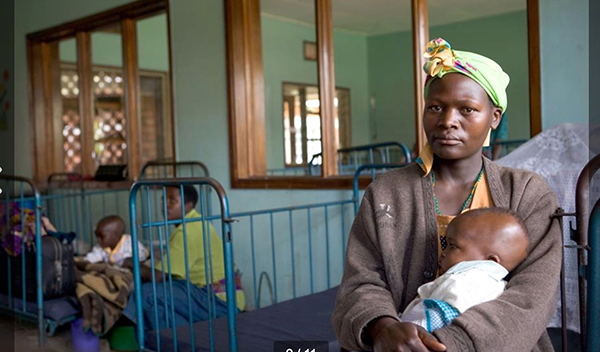
Major drug companies “opted out” of developing a vaccine against the malaria parasite that was killing hundreds of thousands of children in poor countries each year, especially in Africa, because there was no profit to be made from children who could not pay to be vaccinated. (Photo: WHO/Chris Black)
Click to read and download (PDF)
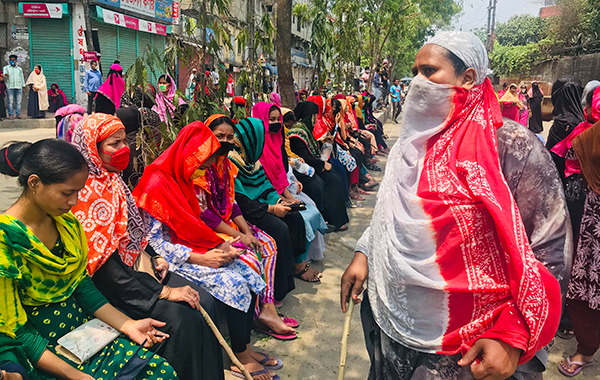
Bangladeshi garment workers block a road demanding their unpaid wages during a protest in Dhaka, Bangladesh, April 16. More than a million of the 4.1 million workers in Bangladesh’s garment industry have been furloughed or fired due to cancelled orders. (Photo: AP)
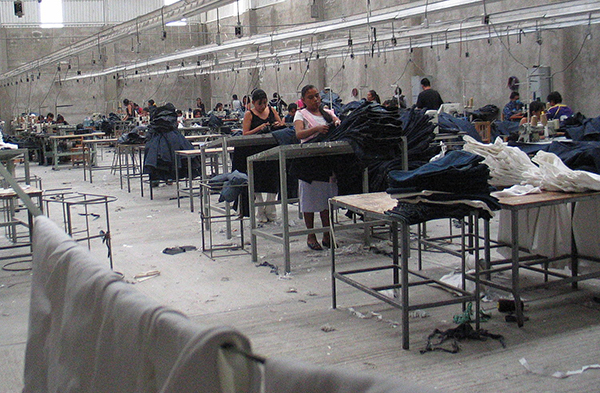
The maquiladora owned by the TECMA group in Ciudad Juárez was the center of a major COVID-19 outbreak. Thirteen employees at the factory have died of the disease, according to Mexican health officials. (Photo: Wikipedia)
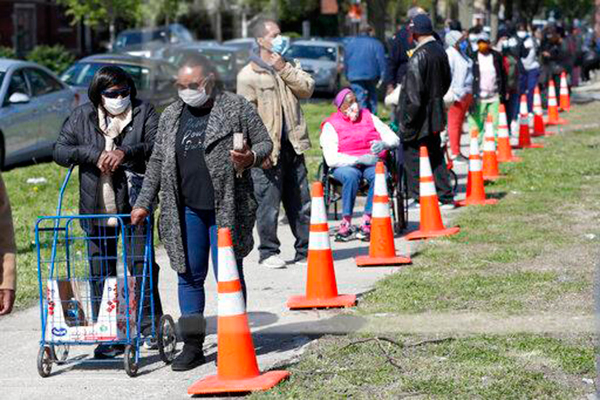
Residents from all walks of life line up for a food giveaway in a neighborhood of Chicago, May 12. Food insecurity has added to the anxiety of millions of people, according to a new survey that finds 37 percent of unemployed Americans ran out of food in the past month, while 46 percent worried that they would. (Photo: AP)
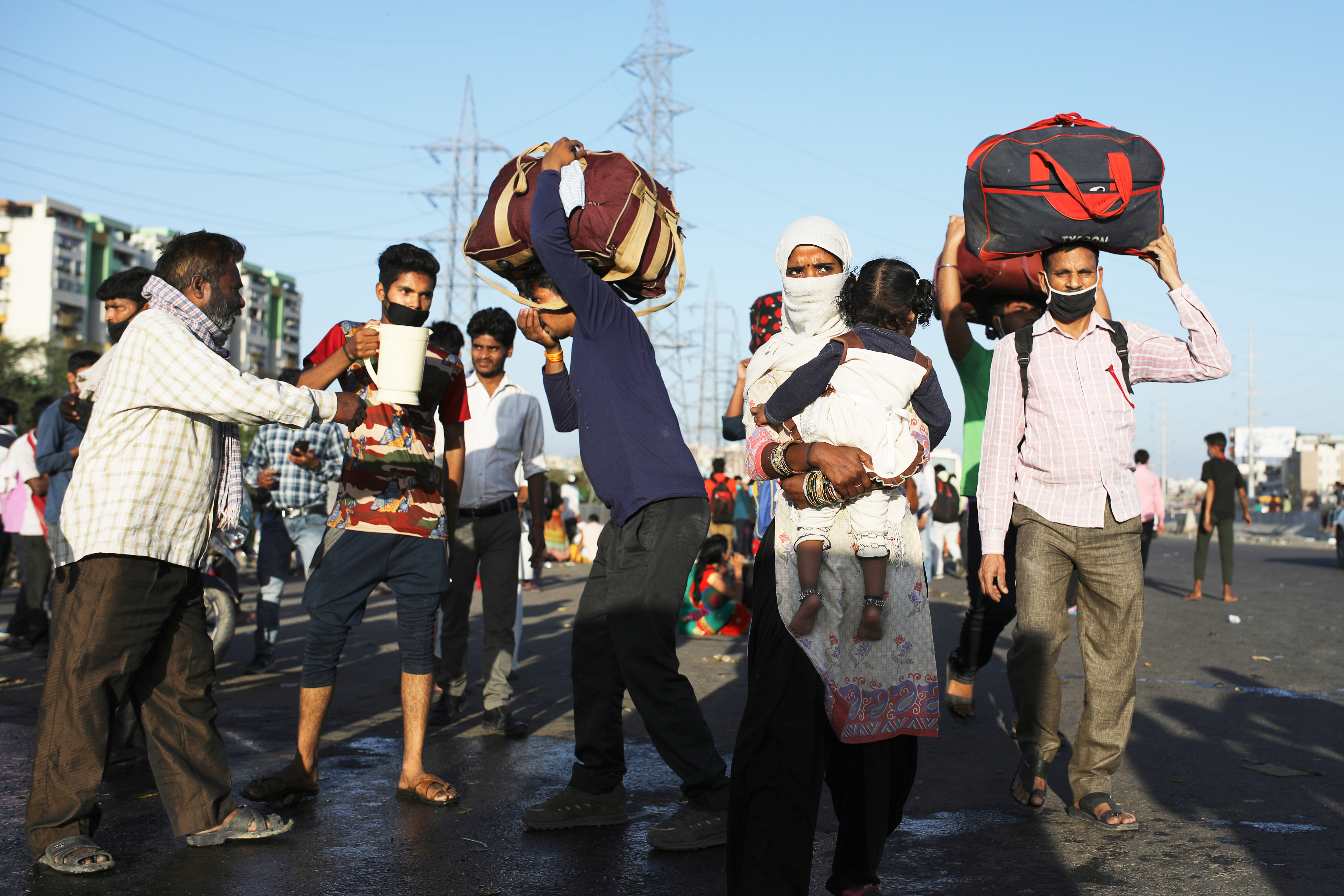
Locals provide drinking water to Indian migrant laborers making their way on foot back to their home villages because big cities were on lockdown amid fear over spread of coronavirus in New Delhi, India, March 28. (Photo: AP)
Get a free email subscription to revcom.us:


